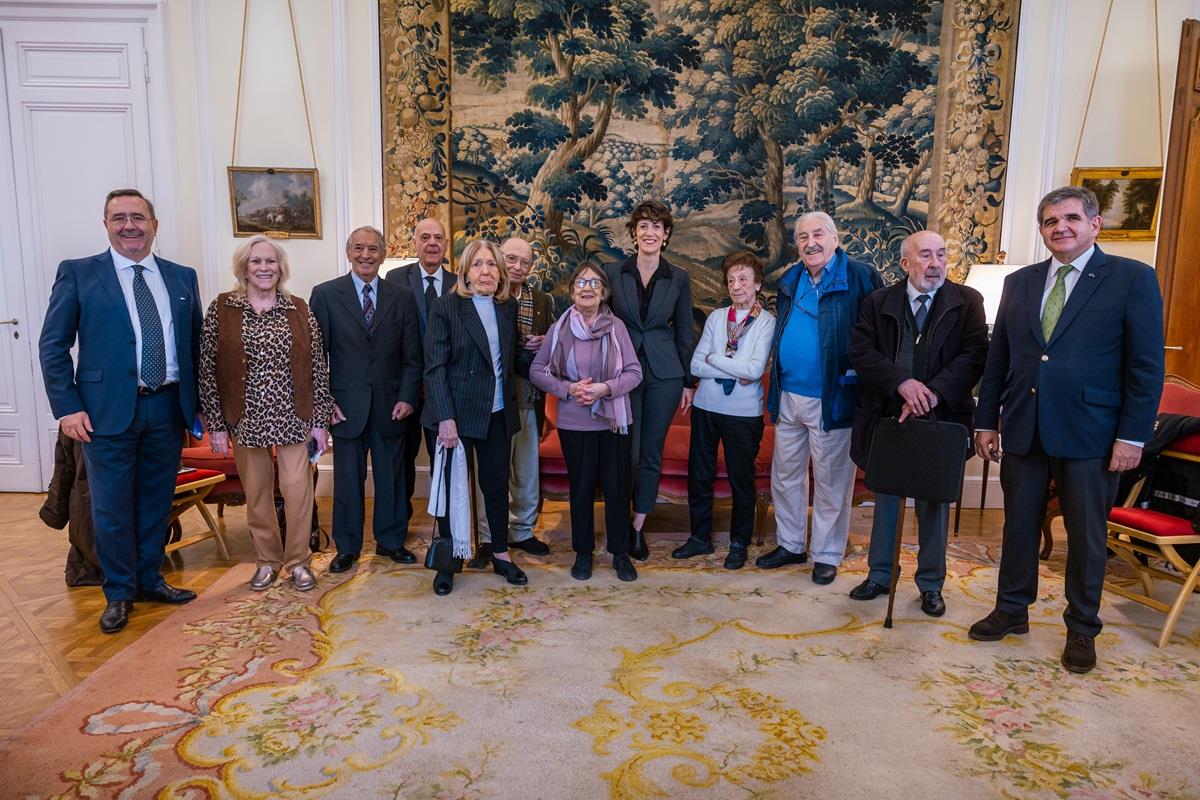Official visit to Argentina
The Government of Spain will extend healthcare for Spaniards abroad to vulnerable groups
News - 2025.5.30
 The Minister for Inclusion, Social Security and Migration, Elma Saiz, with a group of Spanish residents in Argentina
The Minister for Inclusion, Social Security and Migration, Elma Saiz, with a group of Spanish residents in Argentina
Elma Saiz has reiterated the Government's commitment to Spaniards living abroad and has informed them of the new features in the new Regulations on Spanish Citizens Abroad. "We have adapted the regulation to the current reality and we have extended the instruments of protection and assistance to Spanish citizens abroad," said Saiz.
Among the measures included in the new regulation, which will come into force before the end of the year, the minister highlighted the extension of healthcare coverage for Spaniards abroad, which until now was only available to pensioners, to vulnerable groups: minors, victims of sex-based violence and the disabled.
Protection for these most vulnerable groups is specifically reinforced in other respects. For example, vulnerable groups will have easier access to return programmes and special protection is granted to women victims of sex-based violence, including the possibility of receiving help in the country of residence or facilities to return to Spain.
On the other hand, access to public health care for Spanish emigrants temporarily returning to Spain has been simplified by easing complex administrative requirements.
Elma Saiz explained to the Spaniards in Argentina how the regulation also strengthens the role of their associations and the Spanish Residents' Councils, as they play a fundamental role in keeping these people connected to our country.
In this sense, the new regulation increases funding for centres and associations, a census of associations and centres is created to facilitate their participation and access to grants. "By strengthening the Councils of Residents Abroad, we want emigrants to have a greater say in the Government's decisions," explained Elma Saiz, "we want to listen to how we can be useful to them, what their demands are."
The new Regulation on Spanish Citizens Abroad, in addition to the aforementioned measures, improves the processing of the returned emigrant certificate, which can now be done online and in whose process bureaucratic work has been eliminated.
On the other hand, the conditions to qualify for unemployment benefit have been improved if you have worked outside Spain for at least one year in the last six years, in order to make it easier to find a job. The benefit lasts up to 18 months and can be combined with part-time work and reduced proportionally.
Spanish Returns Office
Elma Saiz also gave details to Spaniards living in Argentina about the new Spanish Returns Office, which will be a point of information and support on issues such as employment, housing, education and paperwork.
At this office, information on procedures and how to find a job or start a business can be obtained. It will also facilitate the homologation of foreign qualifications, avoiding lengthy bureaucratic processes, and will coordinate with local councils and autonomous communities to make return easier.
In addition, a website will be set up with all the information and procedures in one place to avoid confusion.
Completion of the official trip
The Minister for Inclusion this Friday also visited the Department of Labour, Migration and Social Security and various sites to remember the 3 million Spaniards who migrated to Argentina throughout the twentieth century, mainly until 1950.
Saiz will be at the Hotel de los Inmigrantes Museum to visit the exhibition "Representing Silence" at the Contemporary Art Centre. The minister considered it essential to have first-hand knowledge of these museums: "Until very recently, Spain has been a country of emigrants. This land warmly welcomed the 3 million Spaniards who came here in the first decades of the 20th century, those who came before and those who have come since. Memory makes us understand who we are and also understand others, those people who today seek prosperity in Spain and whom we must welcome as they welcomed us when we needed them."
Saiz will also visit the Galicia Centre in Buenos Aires. "Half of those people who came to Argentina were Galicians, which is why this visit is so important to me. These centres have served to keep the memory alive, but above all they have helped for generations to maintain ties with Spain and, at the same time, to integrate newcomers. They have been very important for many people.
To conclude the trip, the Minister will visit the Museum of Memory (EX ESMA), a National Historic Monument, evidence of State terrorism and judicial evidence in cases of crimes against humanity in Argentina, as the repressive nucleus of the Clandestine Centre for Detention, Torture and Extermination of the Navy Mechanics School.
With this meeting, the minister concluded her official trip to Argentina, during which, among other acts, she presented the Diploma of Recognition of Emigration Merits to the Association of Children of the Civil War in Argentina. The minister also held a meeting at the University of Belgrano to give a lecture on "Protecting people in order to grow as a country: Social Investment for sustained and sustainable growth," where she placed special emphasis on the value of social investment as an engine of transformation and prosperity.
Elma Saiz also visited neighbouring Uruguay, where she met with the Minister for Labour and Social Security, Juan Castillo, and the Minister for Social Development, Gonzalo Civila, as well as learning first-hand about the concerns of the Spanish community in this country.
Non official translation




